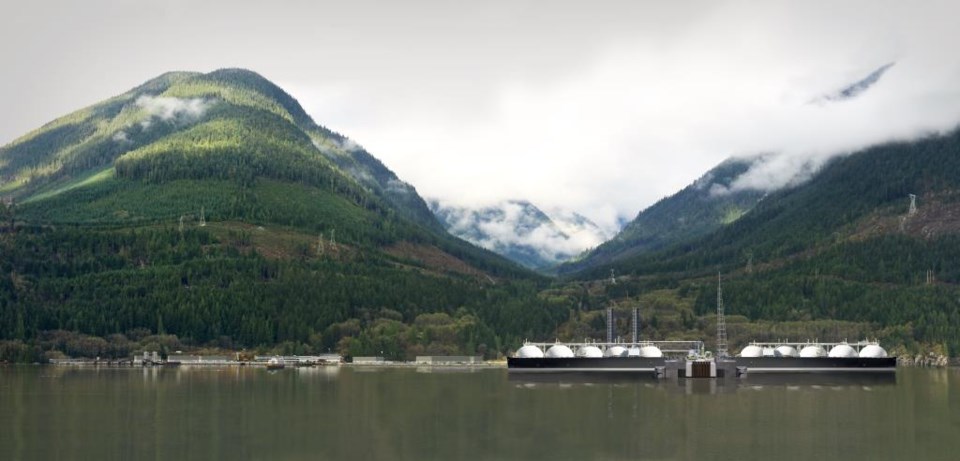Earlier this month, the BC Greens called for a halt to Woodfibre LNG’s Squamish plans, after research into the potential health risks gas flaring poses to pregnant women came to light.
That joint University of Southern California-University of California, Los Angeles study, originally published in 2020 in the journal Environmental Health Perspectives, examined 23,487 live births between 2012 and 2015 to women living near natural gas and oil wells in Texas’s Eagle Ford region that use flaring to burn off excess gas. It showed the pre-term birth rate was 14% among pregnant women exposed to a “high number” of flares, while babies born prematurely could suffer complications such as immature lungs, difficulty regulating body temperature, poor feeding, and slow weight gain.
The study noted that pregnant women regularly exposed to flaring at fossil-fuel facilities are also at a 50% higher risk of premature birth.
In a statement, Woodfibre LNG countered the Greens’ warnings, saying it unfair to compare the Eagle Ford Shale, “an upstream resource extraction area with a significant concentration of gas wells in the area,” to Woodfibre’s planned single liquefaction facility, “designed to only flare in emergency situations or during certain maintenance procedures.”
While it’s true Eagle Ford, a fracking hub, is the most active shale play in the world, with more than 100 rigs running, the study defined a high amount of flaring as 10 or more nightly flare events from a single flare stack within five kilometres of the pregnant person’s home. The planned facility is being built roughly seven kilometres southwest of Squamish.
“[W]e also considered 3 km and 10 km buffers since studies of flaring are limited and the distance at which flares may result in potentially harmful exposures to nearby populations is not well understood,” wrote study co-author and UCLA assistant professor Dr. Lara Cushing, in a subsequent 2021 paper.
Woodfibre LNG has previously said it believes flaring would be used less than 3% of the time, roughly equating to 11 full days a year. But oil and gas and LNG producers routinely underestimate the amount of flaring that occurs at their facilities, said Tim Doty, environmental consultant and retired manager of the Texas Commission on Environmental Quality.
“What they’re describing is an emergency flare,” he said. “That 3%, that’s just a guesstimate depending on how they operate the plant. That’s not necessarily the reality that will happen. Facilities tend to flare more than they usually estimate.”
Even a single flaring event can make already poor air quality that much worse, something that should be taken into account given how the climate is changing in the region, said Dr. Tim Takaro, professor emeritus in the Faculty of Health Sciences at Simon Fraser University.
“If you’ve got a stretch of hot weather, and there’s an inversion in place over Howe Sound, and the air is not moving, the last thing you want is a flaring event,” he said. “They say they only do this for maintenance or in emergencies, so if you’re having a bad air week and they have an emergency, that’s a bad thing. That can be very significant. You don’t need to do it. This sort of thing is preventable. Don’t build it.”
Flaring — the breakdown of methane into water vapour and carbon dioxide — is only one form of emissions associated with LNG plants.
“What [Woodfibre would] like to do is pretend like there’s not a connection between their operation and the big picture,” said Takaro. “They ignore all the connections they have to everything that is not green, everything that is contributing. Methane, which is a gas they call ‘natural,’ is an even worse greenhouse gas than carbon dioxide.”
According to a 2022 NASA study, methane was found to trap about 35 times more heat than carbon dioxide.
The consequences of Woodfibre’s Squamish facility, Takaro added, will be felt for decades to come.
“We’re building this plant now … when we know we’re in a climate emergency,” he said. “The damage from this plant will be felt by future generations more than it will be by people making the decisions now, and that, to me, is a real problem.”
Given an opportunity to respond to some of the statements in this follow-up story, a Woodfibre LNG spokesperson sent the following via email to The Squamish Chief: “We have nothing further to add beyond our previous statement. As we noted previously, comparisons of flaring between very active resource extraction areas and a single liquefaction facility, designed only to flare in extremely limited situations, are not fair or valid. As determined in the regulatory process, there will be no significant impact to local air quality due to the operation of the Woodfibre LNG facility,” said Sean Beardow, WLNG director of communications planning and media relations.
~With a file from Jennifer Thuncher/The Squamish Chief.




